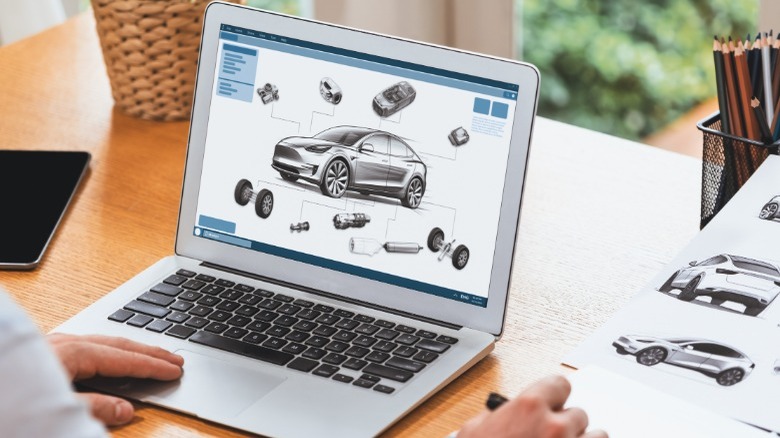6 Mistakes To Avoid When Buying A Car At The Dealership
So, you're buying a new car. First of all, congratulations! But now, it's time to get serious and prepare yourself for the car-buying process, especially if you plan to purchase your new vehicle from a dealership. Buying a used car from a private party is hard enough as it is, and there are various mistakes people make when buying a vintage vehicle. However, shopping at a dealership is a different beast entirely. Between the various trim and model options, limited discounts and promotions, and the infamously pushy salespeople, buying a new car at the dealership can be intimidating, to say the least.
Fortunately, we here at SlashGear can help. I'm a former professional automotive mechanic, and I spent years working in both independent repair shops and dealerships around the country. I've seen the ins and outs of the industry, and I'll draw on that experience to explain some of the most common mistakes you need to avoid when shopping at a dealership. Remember, dealerships pose unique obstacles and challenges when car shopping that you won't encounter if buying from a private party. It's important for both your mental health and your wallet that you prepare yourself for these challenges to avoid unnecessary expenses and headaches. So, from failing to stand your ground to forgetting to sleep on all major decisions, here are six mistakes to avoid when buying a car at the dealership.
Don't fall for pushy sales tactics
Everyone knows the old stereotype: car salespeople are pushy, rude, and, sometimes, dishonest. While I can say from experience that those words don't describe all car salespeople, I'll also say that many stereotypes exist for a reason. The sad reality is that almost all of these people make their living off of commissions, meaning that they'll often do whatever it takes to make a sale. It's understandable, as we're all trying to survive while keeping a roof over our heads and food in our mouths. However, it also sucks to be the victim of a scam or a dishonest sales tactic.
Unfortunately, it's on us to prepare ourselves for pushy salespeople. And just because many of these people are top-notch individuals who wouldn't tell a lie if their lives depended on it, much less to make a sale, we can't assume that all car salespeople will treat us decently. That means going into the process with a bit of an attitude. No, it doesn't mean you should be rude or act like you're better or smarter than the expert selling you the car. It does mean that you should speak firmly, be assertive, remain somewhat skeptical of what you hear, and try to avoid answering sneaky questions. Remember to cross-check any information you get at the dealership with legitimate, reputable facts found online or through another trusted source. If you feel particularly bullied or pushed while shopping, make an excuse, leave, and come back another day or check a different dealership — if someone is pushing you so hard that you begin to feel uncomfortable, they don't care about you or your needs, they're just looking for a paycheck.
Do your research
There are a lot of things that we can't control in this life. However, one of the few things that most of us can control is our education. While not everyone has access to the internet and modern technology, if you're considering buying a car from a dealership, there's no excuse not to do your homework first. Take a bit of time and use the tools at your disposal to educate yourself.
If you're planning to purchase a new vehicle from a dealership, you most likely have access to at least a cellphone or a computer. There's no reason not to do a thorough amount of research before you hand over your hard-earned money. If you walk into a dealership expecting the salesperson to educate you properly and explain the pros and cons of vehicles they sell and those sold by the competition, you can only blame yourself if you end up with a lemon or the wrong car for your needs.
Whether you use your cellphone, a computer, or free resources in your local public library, it's relatively easy to look up car models online these days. Use sites like Consumer Reports, Kelley Blue Book, and Edmunds to read both professional reviews and user testimony. Check for things like recalls and common problems, and compare various vehicle models and trim options before you make a decision. Also, don't just research the car you want to buy — it's also important to look for a credible dealership. In particular, check out what previous buyers have to say in their Google and Yelp reviews, and look into what types of warranties the company provides.
Don't skip the test drive
One thing that many people may feel inclined to do — especially if they're newer drivers or less confident — is to skip the test drive when shopping for a new car. That doesn't mean going for a ride-a-long while the salesperson drives, either. If you're planning to buy a new vehicle for yourself, it's extremely important that you be the one driving it during the test run.
This step is vital for many reasons. First and foremost, if you're going to be the primary driver of the car, it's critical that you feel comfortable behind the wheel. Not every car is right for every driver, and it's important that you test a vehicle's handling, acceleration, braking, and overall comfort before making a purchase. This is important for every car, but it's especially vital in situations where buying the wrong vehicle could make driving extremely difficult. For example, if you don't know how to use a stick shift, you probably shouldn't buy a flashy sports car with a manual transmission. Similarly, if you've never driven a larger vehicle, a huge pickup truck with a long bed may be difficult for you to maneuver.
Finally, if for some reason you can't drive — maybe you're injured, or maybe you don't have your license but are looking for a first car — just wait until you're legally able to do so before buying. If you can't drive anyway, there's no reason to rush into a new vehicle that you haven't personally driven. Remember, it's your money, and you're the one who's going to be driving the car — it's important that you're comfortable behind the wheel and enjoy the driving experience.
Bring a knowledgeable friend or mechanic with you
One thing that many people may fail to do when shopping for a new car is bring a knowledgeable friend or mechanic with them during the inspection. This is less of an issue if you're planning to buy a brand-new vehicle. However, many people buy used or slightly-used cars from dealerships. Furthermore, even new vehicles can have mechanical defects and issues that you may not notice if you're inexperienced with cars.
That said, it's primarily used cars that really require a mechanic's inspection before you buy them. Even if you're buying a one or two-year-old vehicle, it's still vital that someone knowledgeable gives it a quick check before you fork over your hard-earned money. However, performing a pre-purchase inspection isn't the only reason why you may want to bring an experienced friend or mechanic with you when shopping at a dealership.
It's also critical to bring someone with you if you're a less confident or less assertive person overall. Remember, the first point on this list is to avoid falling for pushy sales tactics. If that's something you struggle with, you may want to bring a more aggressive or knowledgeable friend with you. That way, if the salesperson gets a little forceful, your friend can step in and help you out. There's absolutely no shame in this — we each have our strengths and weaknesses, and some people are just naturally more assertive than others. If you have a friend or family member willing to help you out, accept the help and don't worry about how it makes you look.
Remember that deals come and go
When shopping at a car dealership, it can be tempting to jump on seasonal promotions and deals. We've touched on this briefly already, as we've covered the fact that you need to avoid falling for pushy sales tactics. However, promotions and seasonal deals can feel slightly different since it may not always be the salesperson pushing you to buy in these cases. When it comes to these types of sales, you may have to battle with your own impulsivity instead of a pushy salesperson.
That's why it's important to remember that deals come and go. It's incredibly common for dealerships to have seasonal promotions and bargains. They may even market these promos as being once-in-a-lifetime opportunities or one-time deals. However, that's almost never the case. Every year, dealerships around the country offer dozens of sales in honor of holidays, special events, new model releases, and various other occasions. Most of the time, these sales are basically all the same. If you miss one, another one is usually right around the corner, and you may even be able to find a better promo by driving across town to a different dealership.
Finally, it's also important to remember that dealerships set their own prices. It's incredibly common for dealerships to add thousands of dollars or more onto the manufacturer's MSRP, and then, when they do have a sale, it makes the prices look even more attractive. Remember that fact, and try to look into the actual MSRP for the car you want to buy — doing so can help you get a good idea of whether or not the dealership's promo is worth it or they're just price gouging you.
Sleep on all major decisions
Everything we've covered so far ties into this point: don't rush into any major decisions, especially if they involve large sums of money. That means take some time, go home, and sleep on your decision. This is especially important when buying from a dealership, as the deal itself will most likely still be there the next day. That's in comparison to buying a used car when you never know if another buyer is going to come swooping in and offer a bit more cash than you. Dealerships almost always have multiple models of the same car, and even if they don't, they can usually order another one for you. You also have the option of visiting multiple dealerships and browsing various inventories. You can use the internet, and if you find something you like, many dealerships will work with you to get the car shipped to your location.
Remember, even if a salesperson tries to convince you that you're missing out on a once-in-a-lifetime deal, don't rush into any big purchase. Buying a car, especially a new one from the dealership, is a huge decision and a massive financial commitment. It's perfectly fine — and extremely smart — to take at least a few days to think it over. Do your research, compare prices and specifications, and test drive a few different model options. Following those steps will not only help you get the best car for you, but it will also protect your wallet from unnecessary expenses and save you a ton of stress in the long run.






